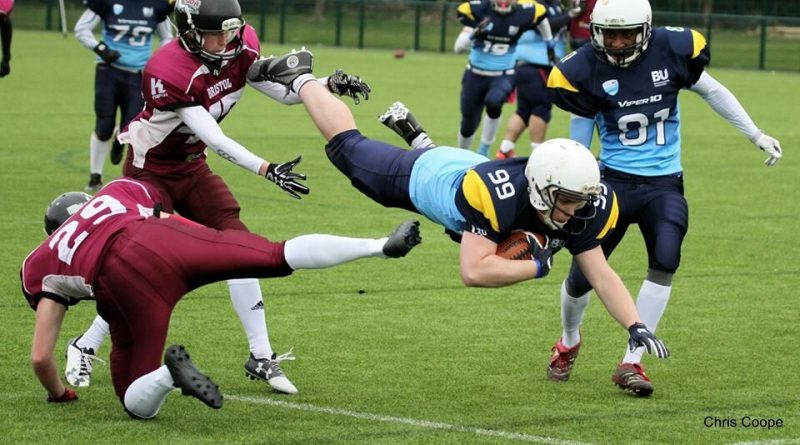BAFA 2017 Rule Changes
Rule Change Summary:
- Low Blocking rules changed (see separate article all about low blocks)
- Coaches can now be disqualified
- Defenseless player now includes sliding runner (see separate article on high hits)
- 30 second time-outs no longer allowed
- Team A must allow substitution match ups
- Tripping the runner is now illegal
- Teams must remain on the sideline during the coin toss
- Crown of the helmet definition expanded
- Video rule introduced
- Medical requirements changed
- New concussion protocol (for why it’s important see this article)
Clarity changes:
- Blocking requires intent
- Low hit on passer
- Targeting requires ‘indicator’
- Intentional grounding clarification
- Horse collar tackle extended
Low Blocking
What is and isn’t legal related to low blocking has always been a difficult area for players and officials to understand and with a view to making things easier there has been a slight change to simplify the rules.
To fully understand the rule changes, take a look at my article about blocking low.
However, the change is the removal of the Low Blocking Zone (the area within which players were allowed to make largely unrestricted blocks below the waist) has been abolished and now only players in the tackle box remain unrestricted. The net effect is to impose restrictions on tight ends and wing backs that already applied to wide receivers.
Coaches can now be disqualified
The rule that a player was automatically disqualified if he committed a second unsportsmanlike conduct foul has now been extended to coaches.
Defenseless player now includes sliding runner
Targeting rules are intended to minimise some of the worst effects of concussion by limiting the type of contact possible when a player is not in a position to adequately defend themselves such as when their focus is on catching a ball. The list of “Defenseless’ players is now increased to also cover “A ball carrier who has obviously given himself up and is sliding feet-first. See the article all about high hits.”
30 second time-outs no longer allowed
It used to be possible to indicate you wanted a 30 second timeout (usually times when you wanted to just control the clock). This is now no longer possible.
Team A must allow substitution match ups
When the offence makes a substitution the defence are allowed an opportunity to match up their personnel. “When Team A sends in its substitutes, the officials will not allow the ball to be snapped until Team B has been given an opportunity to substitute.”
Tripping the runner is now illegal
Tripping has long been a foul, with a previous exception allowed against the runner. This exception has now been removed.
Teams must remain on the sideline during the coin toss
Some teams tried to intimidate the opposition by moving some way onto the field during the coin toss. This behaviour has now been outlawed. Other than the team captains all players must now remain in their team area.
Crown of the helmet definition expanded
The previous definition of the crown of the helmet was something akin to a monks’ bald spot. The crown of the helmet is now the portion of the helmet above the level of the top of the facemask.
Video rule introduced
IFAF has now adopted a Video Judge rule that goes beyond existing NCAA and NFL replay rules. It allows a Video Judge to assist the on-field officials with a much wider range of calls, all with the aim of getting the play right. Our rules do not require the large-scale TV coverage that US replay demands. IFAF’s rule was trialed last summer at the European Championship qualifying tournament hosted by BAFA in Worcester and proved very successful.
Medical requirements changed
The following professions have been added to the list of acceptable medical personnel:
• Sports rehabilitator registered with BASRaT.
• Sports therapist registered with the Society of Sports Therapists.
• Sports massage therapist registered with the Sports Massage Association.
• Osteopath registered with the HCPC.
• Chiropractor registered with the HCPC.
Whatever profession, the practitioner must hold a NQF Level 3 or higher first aid qualification. For some professions this is a mandatory part of their professional training. For others, the individual must have
acquired a suitable qualification by other means.
The professional practitioner must have carried out a risk assessment and determined that they are competent and equipped to carry out emergency life saving.
New concussion protocol
As discussed there is a drive to ensure suitable steps are taken to minimise the chance of concussion. However when concussiion is identifed it is equally important to treat it correctly. BAFA have introduced a new concussion protocol.
Rule Clarifications
Blocking requires intent: for example a player dives at an opponent to make a tackle but misses and hits another opponent in the back of the legs, this would not be clipping because clipping is a block and a block now requires intent.
Low hit on a passer: “It is not a foul if the defender grabs or wraps this opponent in an attempt to make a conventional tackle without making forcible contact with the head or shoulder.”
Horse collar tackle: The horse collar tackle rule has been extended it gives extra protection to players whose knees buckle though they are not pulled completely to the ground. It also covers grabbing the player by the name plate.
Jim Briggs, Chairman of both the BAFA Rules Committee and the IFAF Rules of the Game Committee said..
“We continue to make improvements to the rules to make the game safer and to encourage better sportsmanship. The changes to the medical rules should give clubs more flexibility in securing effective medical cover. The concussion protocol will reduce the likelihood of players suffering major brain injury.”


